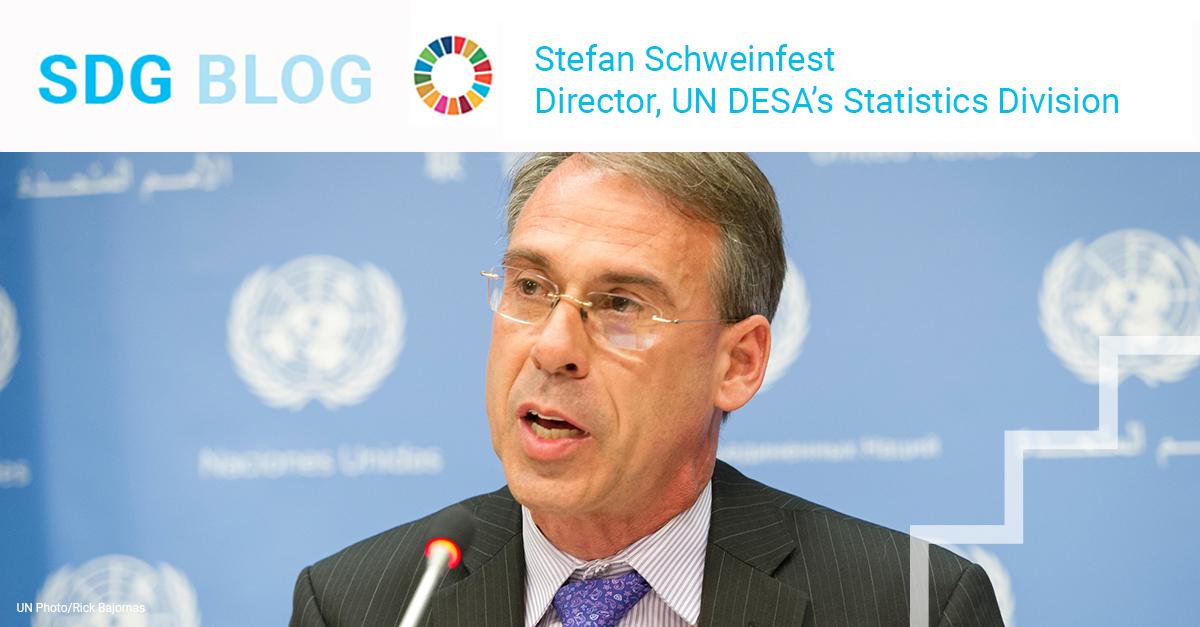SDG Blog

Renewing the Global Action Plan for Sustainable Development Data
By Stefan Schweinfest, Director, UN DESA’s Statistics Division
This month’s UN World Data Forum in Medellin comes at a critical time for the development of data and statistics and a chance to renew our shared agenda. In September, global leaders gathered here in New York for the beginning of a new session of the UN General Assembly. A Summit of the Future was held just before, to shape a more sustainable pathway for people and planet through three important outcomes: the Pact for the Future, the Global Digital Compact and the Declaration on Future Generations.
The upcoming UN World Data Forum will be organized with these outcomes in mind, as well as building on the Power of Data High Impact Initiative launched at last year’s SDG Summit. Each Summit outcome document is forward looking and emphasized different data issues like financing gaps, climate action; digital technologies, skills, data governance; and leveraging science, data, and statistics to ensure long-term thinking and sustainable practices. The Forum uses the convening power of the UN to focus on all these issues in more detail.
The programme in Medellín will showcase in over two-thirds of its sessions, topics similarly focused on the future; such as youth, gender, climate and environment, digitalization and modernization, capacity development, data literacy and data science including AI. The Forum’s own outcome document also contains a forward-looking vision for the renewal of the "Global Action Plan for Sustainable Development Data". It was recently published for public consultation and makes clear connections to the Summit of the Future.
The renewed plan will be a second-generation document of the original Cape Town Global Action Plan for Sustainable Development Data (CTGAP) launched at the first Forum and will build momentum on sustainable development data ahead of the SDG's 2030 deadline.
The open consultation which concluded on 31 October, has sought opinions from across the statistics and data communities on how this action plan can best contribute to the achievement of better data for better lives.
At the center of the revised action plan are 12 new priorities organized under four areas: 1) innovation and modernization for better and more inclusive data and statistics; 2) use and value of data and statistics for better decision making; 3) institutional leadership in the building of trust, protection and ethics of data and statistics; and 4) partnerships to mobilize resources and coordinate efforts to develop data and statistical capacity.
We are pleased to be working with our partners in Open Data Watch and the Partnership in Statistics for Development in the 21st Century (PARIS21). They launched a Commit to Data campaign earlier this year, to explore the potential and feasibility of sourcing commitments for the new global plan.
I am proud the data and statistics community continue to use the Data Forum as a rallying point to advocate for high-quality, timely, open, and inclusive data to accelerate progress on the SDGs, and to address the multiple crises that threaten our world. Such data make any tracking of the SDGs possible whether locally, nationally, regionally or internationally. The recent annual Sustainable Development Goals Report showed that of the 169 global SDG targets, 34 targets lack sufficient trend data or additional analysis and among the 135 assessable targets, only 17 per cent display progress sufficient for achievement by 2030.
We will continue to support countries, especially those in fragile contexts, to use the Forum to advocate for strengthening their own statistical systems, improving data quality, and expanding data coverage to leave no one behind.
Until then, espero verte en Medellín…
 Welcome to the United Nations
Welcome to the United Nations